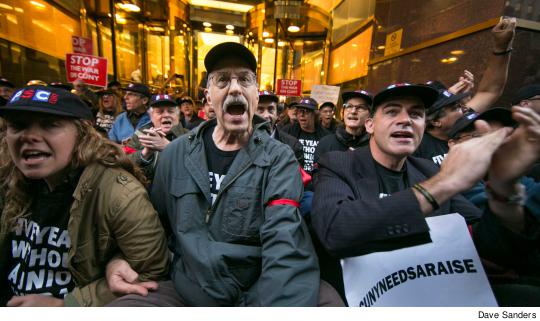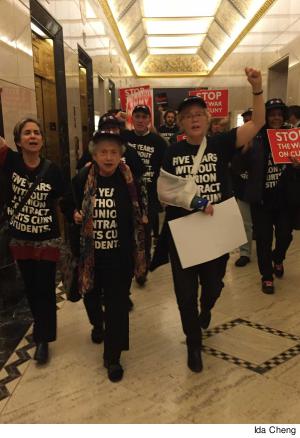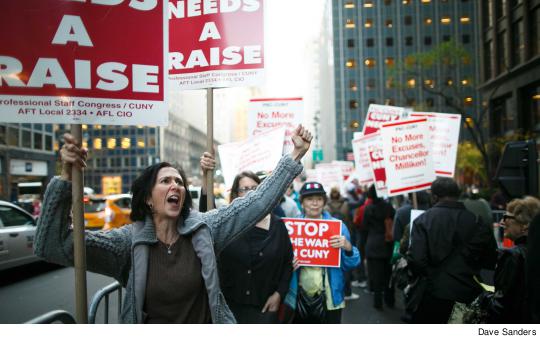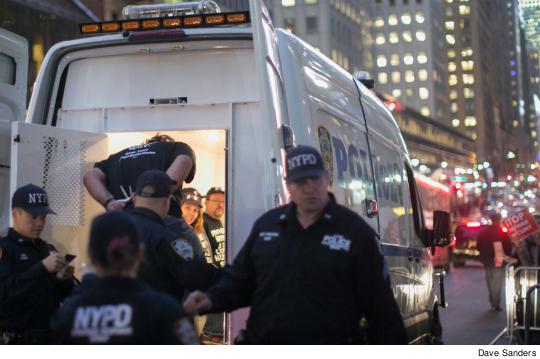Participating in a civil disobedience action on November 4, more than 50 PSC members were arrested and loaded into police wagons as hundreds more members and allies cheered them on.
 |
As night fell on East 42nd Street, protesters filled the sidewalk and spilled into the street in front of CUNY headquarters. The union’s bargaining team caucused indoors, having just received an economic offer from university management that PSC President Barbara Bowen characterized as inadequate. First among the problems identified by the PSC bargaining team in the management proposal was its failure to include salary increases at even close to the level of inflation. It also failed to provide retroactive pay increases for four of the years in which union members have been without a contract.
Inadequate Offer
It took six months for management to respond to the economic proposal put forward by the union in May. Having gone five years without a contract and six years without a raise for its members, the union finally received the offer only after announcing plans for a sit-in at the entryway to the CUNY headquarters building.
 |
Both in the negotiating room and on the street, PSC members wore red ribbons tied around their arms indicating their willingness to risk arrest in order to shut down access to CUNY offices until either an adequate offer was received, or they were carted off to jail.
The New York Police Department turned out in force, with scores of officers at the ready, plastic handcuffs dangling from their belts, poised to walk sit-in participants into one of the police wagons that lined the curb.
Students Turn Out
On hand, as well, were a number of CUNY students ready to fight another proposed round of tuition increases as the state threatens to decline funds for mandatory cost increases in the operation of the university. (See “PSC and students resist tuition hikes.”)
“I came down here with a bunch of students,” said Jonathan Buchsbaum, professor of media studies at Queens College, where he chairs the PSC chapter. “Everyone is concerned about the institution; they feel it’s being disserved by politicians who don’t believe in supporting public institutions with public money.” Around his right arm, Buchsbaum wore a red ribbon.
“I’m ready to sit down in front of this building until I have to move,” said Ken Estey, associate professor of political science at Brooklyn College. In the present dynamic with CUNY management, he added, “it’s only with blocking the way that you open up the possibilities.”
George Emilio Sanchez, chair of the PSC chapter at the College of Staten Island (CSI), sported an orange marshal’s vest as he walked the barricades set up by police to contain the crowd. He was there to help maintain an orderly process as people took part in the civil disobedience action, he explained, and to help keep the rally going strong as people were arrested. “I do see the membership galvanizing,” said Sanchez, a professor of performing and creative arts who chairs his department at CSI. “I see them coming together, I see more actions taking place. And that’s really important because I think that’s what’s gonna tip it.” An acceptable offer, he said, will “come from our demanding it.”
As the bargaining session wrapped up inside the building, First Vice President Mike Fabricant, wearing a red armband, rallied demonstrators outside.
“No contract! No peace!” he chanted, speaking through a public address system. “Education is a right!”
‘Gesture of Contempt’
Inside CUNY headquarters, the bargaining team and PSC observers — who together numbered around 35 — emerged from the elevator led by Bowen, and marched through the lobby chanting, “What do we want? Contract! When do we want it? Now!” All wore the black T-shirts that have come to symbolize the PSC’s contract campaign, inscribed in block letters with the words “FIVE YEARS WITHOUT A UNION CONTRACT HURTS CUNY STUDENTS.”
As Bowen exited the building to take the microphone, she and many others who attended the session took their places along the barricade where those willing to risk arrest had lined up. “We’re lined up to be civilly disobedient,” said Robert Farrell, an associate professor in the Library Department at Lehman College, with a hint of irony.
 |
“It has taken the threat of a sit-in and arrests to get them to put one penny on the table,” Bowen told the crowd. CUNY management’s paltry offer, she said, represents “a gesture of contempt to our students and to us,” because the failure of management to offer a raise structure that keeps up with the rate of inflation means that CUNY will not be able to support its current workforce decently, and that it will fail to attract the faculty and staff its students deserve.
The children of working-class New Yorkers, Bowen continued, “shouldn’t have a crappy education, shouldn’t have a merely adequate education, shouldn’t have a third-rate education — they should have the best education. And that’s what we are fighting for — the right of our students to have the resources they need to have the education they deserve.”
The crowd in the street responded with cheers.
Raising Consciousness
Warren Orange, an academic adviser at the Center for Worker Education at City College, was among those cheering. “CUNY is such an important institution in the city,” he said. “For the majority of people, it’s our opportunity to better our lives. For some of us, it’s the only opportunity.” He turned out for the rally, he said, because “I want to raise consciousness.” Too few New Yorkers know that CUNY faculty and staff have gone so long without a raise, he added.
Police floodlights shone on the building entrance as darkness fell. Chanting “Tax the rich, not the poor; stop the war on CUNY!” groups of PSC members began to sit in front of the doorway, locking arms in tight rows. Soon the entryway was filled with PSC members, including the union’s officers. Overhead, helicopters from local television news outlets hovered, while on the street, members and allies chanted in support, hoisting signs that read “CUNY NEEDS A RAISE!” and “NO MORE EXCUSES, CHANCELLOR MILLIKEN!” Some beat a plastic water-cooler jug with a drumstick, while others raised a ruckus with percussion instruments.
Using their own public address system, police triggered an automated message delivered in an ominous-sounding male voice: “This is the New York City Police Department. You are unlawfully obstructing the entrance to this building…. If you refuse to disperse, you will be placed under arrest and charged with disorderly conduct.”
“This is my first civil disobedience,” said adjunct and graduate student Haneen Adi, who teaches English at Brooklyn College. She described what she called “an attack on CUNY” as targeting the poor, the working class and people of color. “I’m Palestinian,” Adi explained. “[This] goes pretty deep politically, and social justice is just a part of my identity.”
Trained and Ready
All of those who took part in the civil disobedience action received training from the union. Even though Farrell had never been part of an arrest-risking action, he wasn’t nervous. “I think we’re all very well trained,” he said. “We are all nerdy enough to know what to do and what not to do.”
“We’re at a point now where you really have to put your money where your mouth is and put yourself on the line,” Farrell added. “Part of being in a union is about demonstrating solidarity, participating in collective actions.”
In This Together
Dave Kotelchuck, a retired member of the Hunter faculty, explained why he came out for the rally despite the fact that the contract fight doesn’t affect him directly.
“Solidarity means to me the same thing that Social Security means for the country as a whole, that the folks in the older generation have to support the folks in the younger generation as the younger generation supports us when we get our Social Security payments,” he said.
 |
When the numbers of protesters sitting cross-legged, chanting, in front of the building overflowed onto the sidewalk, officers moved in, cuffing several union members and, walking them to the police wagons parked in a line along 42nd Street.
Andrea Vásquez, a higher education officer at the Graduate Center and member of the PSC Executive Council, stood in handcuffs on the sidewalk, watching as her colleague, Chapter Chair Luke Elliott-Negri, a doctoral student in sociology, was led away as several of his students tried to get his attention, yelling, “Professor! Professor!”
“Thank you for coming,” Vásquez told the students as Elliott-Negri was led into the back of a police wagon. “It’s really important that you know our fight is your fight.”
Demanding Respect
Vásquez, managing director of the Graduate Center’s New Media Lab, is on the PSC bargaining team, and was at the negotiating table when CUNY Vice Chancellor Pamela Silverblatt described management’s offer.
The way Vásquez sees it, management hasn’t been willing to go to the mat for the university. “CUNY [management] needs to go to Albany and demand funding for this university,” Vásquez said, as she waited to be taken by police for booking. “[They need to] show some respect for their university because we are CUNY, it’s not just the ‘stars’ whom we see on the [CUNY recruitment] posters in the subway. It’s not just the students who earn big awards and get grants. We have half a million students at CUNY. Half a million students deserve a good education, and the thousands of faculty and staff who work at CUNY deserve good salaries and good raises, decent raises.”
Mass Arrests
The chants of protesters, punctuated with rhythmic blasts from a lone vuvuzela horn and the pounding of drums, provided the soundtrack to the stream of sit-in participants being loaded into police vans. The chants continued as 53 PSC members were carted away to One Police Plaza for booking.
There, they were placed in holding cells, men separated from women, until they were released at around midnight. They were charged with disorderly conduct.
Read and view media coverage of the PSC’s civil disobedience action and rally.

